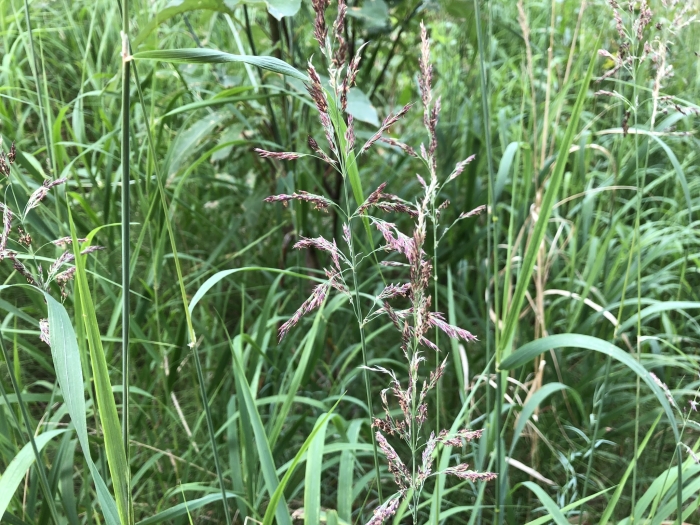Bluejoint
(Calamagrostis canadensis)
Bluejoint (Calamagrostis canadensis)
/
/

Jason Grant
CC BY 4.0
Image By:
Jason Grant
Recorded By:
Copyright:
CC BY 4.0
Copyright Notice:
Photo by: Jason Grant | License Type: CC BY 4.0 | License URL: http://creativecommons.org/licenses/by/4.0/ | Rights Holder: Jason Grant | Publisher: iNaturalist | Date Created: 2019-07-10T16:35:16-07:00 |



















































Estimated Native Range
Summary
Calamagrostis canadensis, commonly known as Bluejoint, is a semi-deciduous perennial grass native to a wide range of habitats including wet meadows, marshes, stream banks, and open woodlands across North America, extending to Alaska and Greenland. It typically grows to heights between 60 centimeters and 1.5 meters with a branching stem. The leaves are flat and drooping, rough to the touch due to tiny hairs. The inflorescence, up to 25 centimeters long, varies from open and loose to narrow and densely packed with purplish spikelets, each about half a centimeter long.
Bluejoint is valued for its ability to stabilize soil in wet areas, making it an excellent choice for erosion control. It is also one of the first plants to reestablish in disturbed sites, such as those affected by oil spills. However, its vigorous growth can pose challenges in forest restoration projects where it may outcompete conifer seedlings. For cultivation, Bluejoint prefers full sun to part shade and requires medium amounts of water, thriving in soils with medium to slow drainage. Its resilience and adaptability make it suitable for naturalistic plantings and restoration projects. Gardeners should be aware of its potential to spread and manage it accordingly to prevent unwanted dominance in a planting scheme.CC BY-SA 4.0
Bluejoint is valued for its ability to stabilize soil in wet areas, making it an excellent choice for erosion control. It is also one of the first plants to reestablish in disturbed sites, such as those affected by oil spills. However, its vigorous growth can pose challenges in forest restoration projects where it may outcompete conifer seedlings. For cultivation, Bluejoint prefers full sun to part shade and requires medium amounts of water, thriving in soils with medium to slow drainage. Its resilience and adaptability make it suitable for naturalistic plantings and restoration projects. Gardeners should be aware of its potential to spread and manage it accordingly to prevent unwanted dominance in a planting scheme.CC BY-SA 4.0
Plant Description
- Plant Type: Grass
- Height: 2-5 feet
- Width: 2-5 feet
- Growth Rate: Moderate
- Flower Color: N/A
- Flowering Season: Spring
- Leaf Retention: Semi-Deciduous
Growth Requirements
- Sun: Full Sun, Part Shade
- Water: Medium
- Drainage: Medium
Common Uses
Bird Garden, Butterfly Garden, Deer Resistant, Low Maintenance, Water Garden
Natural Habitat
Wet meadows, marshes, stream banks, and open woodlands across North America
Other Names
Common Names: Marsh Reedgrass, Meadow Pinegrass, Marsh Pinegrass, Canada Bluejoint, Canadian Reedgrass, Bluejoint Reed Grass, Calamagrostide Du Canada, Bluejoint Reedgrass
Scientific Names: , Calamagrostis canadensis, Calamagrostis cinnoides, Calamagrostis canadensis var. robusta, Calamagrostis canadensis var. macouniana, Calamagrostis canadensis var. scabra, Deyeuxia canadensis, Calamagrostis scribneri, Calamagrostis lactea, Calamagrostis canadensis var. lactea
GBIF Accepted Name: Calamagrostis canadensis (Michx.) P.Beauv.